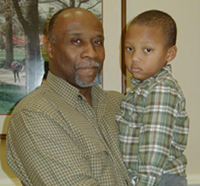| Maryland Newsline |
| Home Page |
Politics
|
For Terrorism Survivors,
Painful Memories Remain After Wounds Have Healed
Capital News Service Friday, March 4, 2005 WASHINGTON - James Harper still has nightmares about what happened. After watching his friend Joseph Curseen die in 2001 from anthrax exposure at the Brentwood postal facility where they worked, Harper said he is more isolated now. The Accokeek resident still goes through periods of depression that prevent him from keeping a steady job. "At times it's hard falling asleep," Harper said. Other Brentwood workers are also still dealing with the effects of the attack. Some developed physical conditions, such as enlarged hearts, kidney failure and respiratory problems, from the exposure, the stress or the treatments. But most said they suffered, and still are suffering, even though their scars are not as obvious. Health officials say psychological consequences of terror attacks can be more destructive than physical wounds, and they are beginning to train health workers in how to identify and handle victims who experience psychological trauma. "I think the stresses are still prevalent," said Dena Briscoe, a fellow Brentwood postal worker who founded a support group for survivors, Brentwood Exposed. The "majority of lives have changed," she said. "Post-traumatic stress disorder and psychological consequences" can be more destructive to lives than physical wounds, and cost more money, said Victor Welzant, director of acute trauma services at Sheppard Pratt Health System. Such afflictions are "long term and insidious, show up later, last longer, and don't get diagnosed initially," he said. Using federal bioterrorism preparedness grants, Sheppard Pratt has been offering seminars to educate health workers in Maryland on how to identify and handle such victims. The 20 scheduled seminars, which are being offered in conjunction with the Maryland Hospital Association, began in September and will continue through April. "We're trying to prepare hospital and mental health personnel, ambulance personnel, on how to deal with emotional aspects of (trauma) in the initial response," said Richard J. Ottenstein, chief executive officer of the Workplace Trauma Center, which offers training and response services. "Any kind of disaster situation where it's going to affect people emotionally, creating anxiety, stress, grief, any of those things," said Ottenstein, who has spoken at the seminars. More than half of disaster workers can be expected to develop significant post-traumatic stress in their careers, according to the National Institute of Mental Health. It also said that psychological impairments from a disaster can outnumber physical trauma 10-1. Helen Barnes, a geropsychiatric nursing counselor for Prince George's County Department of Family Services, stressed at a recent seminar that a bioterrorist attack is not simply meant to inflict physical pain. "The goal isn't necessarily violence, but to affect a community psychologically," she said. After the first priorities of food, shelter and water, Ottenstein said that trauma response can include an onsite support center where workers can talk with victims "about all of the stresses they might encounter, help them to process what they are going through and connect them with resources." Resources can include health care, education on health-related issues, help with the adjustment to a new job location, and spiritual contacts. We would "follow up till we could see they were doing OK," Ottenstein said. For Briscoe, follow-up included starting up the support group. Doctors urged her to do it, she said, and the meetings became a form of healing for the "community of survivors." The Clinton woman also said that doctors urged her to attend the funerals of her colleagues Curseen and Thomas Morris to get her back into society. It was not an easy process. "It was hard to come out of the house," she said. For six weeks following the attack, Briscoe could not work. She only went out to see doctors for treatment for her exposure to the anthrax, which included at least 60 days of heavy antibiotics. The medications for the Brentwood workers were changed early in their course of treatment, after the Centers for Disease Control and Prevention thought that the original drugs might only be masking their anthrax symptoms and not eradicating the illness. The Brentwood building was contaminated with deadly anthrax after a letter to then-Sen. Tom Daschle, D-S.D., was routed through the massive postal facility, which handled mail coming into the Capitol. The letter was laced with the deadly spores. The fears and uncertainties reached beyond the immediate victims: Forestville resident Vincent Gagnon, another Brentwood survivor, at first worried about exposing his children and grandchildren to anthrax. "I feared for my life," said Gagnon, who said he deals with his troubles through humor, even though it might not always be funny. Both Gagnon and Harper said it helps to have someone to talk to. "It helps to have somebody who actually listens," said Gagnon. Otherwise, he said, "I'm not sure my wife would still have me."
Copyright © 2005 University of Maryland Philip Merrill College of Journalism
|

